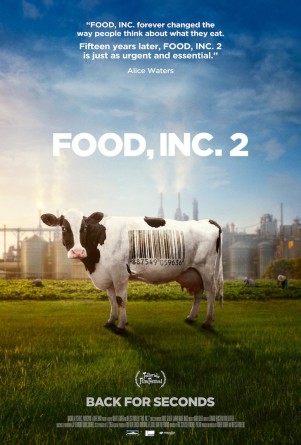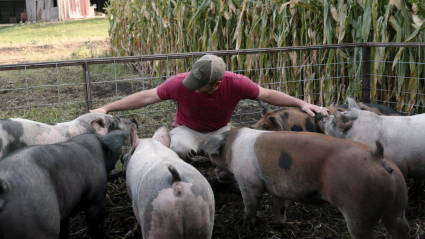Our Review
Movie: FOOD, INC. 2
Rating: NR`
Length: 1:34
Release Date: April 12, 2024
Jeanne: Co-directors Robert Kenner and Melissa Robledo of FOOD, INC. 2 never intended to create a sequel to their Oscar-nominated documentary FOOD, INC. (2008). However, following the pandemic when it became abundantly clear that meatpacking plants in the U.S. had become unintentional breeding grounds for Covid-19 and our food supply was threatened, Kenner and Robledo realized there was more to the story which needed to be told.
Most consumers don’t bother with the day-to-day workings of our food system. Left unchecked by our government, multinational corporations have consolidated their efforts to control our food supply, forming monopolies which in turn cause great harm to the planet, our health and the workers who suffer the most. Investigative authors Michael Pollan and Eric Schlosser reunite with Kenner and Robledo to bring these destructive practices to light.
According to Pollan, FOOD, INC. 2 is “a story about power”. There are just a few select companies controlling every aspect of the food industry. Despite being highly efficient, our nation’s food system has become drastically vulnerable, with these monopolies focused only on increasing profits.
One of the most egregious results of our current system is the exploitation of workers. In the film, pickers in Florida, mostly immigrants, are paid pennies a pound to bring tomatoes to market. Instead of celebrating these individuals who perform the jobs most Americans wouldn’t dream of doing, the rampant racist and anti-immigrant rantings of a certain few have denigrated these poor people even further, putting our food supply at risk.
Fast food employees don’t have it much better. Accounting for inflation, these workers make less than they did in the 1960s. Many who work for Taco Bell and McDonald’s must rely on food stamps and public assistance to survive because of the lack of benefits such as healthcare, sick leave and parental leave. In fact, the CEO of Yum Brands, which happens to own Taco Bell, makes $13,259 per hour, which is more than a Taco Bell employee makes in a year ($13,082). It’s beyond disgusting.
But the news isn’t all dire. U.S. Senators Jon Tester and Cory Booker, both Democrats, are at the forefront of recognizing the problems we are facing and working on solutions which will help our farmers and our consumers. Farmers are exploring innovative ways of growing crops and feeding their animals. Zach Smith is one of these. On his farm in Iowa, he operates solar-powered mobile pens that he invented. And Bren Smith in Connecticut farms the ocean for kelp, which is a sustainable food source and sequesters carbon.
FOOD, INC. 2 also addresses the harmful proliferation of “ultra-processed” foods, which are adding to increased numbers of diabetics worldwide and contributions to other chronic diseases. Kenner and Robledo have made quite a statement regarding the current problems surrounding our food systems and health issues. It’s a riveting 94 minutes and should be seen by anyone who eats, which means every woman, man and child on the planet.
Opinion: See It Now!
David: There is much to unpack after viewing this compelling, carefully constructed and complex documentary. FOOD, INC. 2 is the sequel to the original FOOD, INC from 2008 that was nominated for an Oscar and won an Emmy. Directed again by Robert Kenner and co-directed by Melissa Robledo, FOOD, INC. 2 is a film that demands to be widely seen, especially in schools.
In one school district in New Jersey due to U.S. Senator Cory Booker’s efforts, students now eat and enjoy fresh food from local farmers, replacing their high calorie, high sugar diets with plant-based alternatives that promote good health and reduce obesity. Who knows? One day the traditional child complaint about having to eat vegetables may become a thing of the past.
Since the first documentary, many large corporate entities have recognized that they may have to make a sacrifice to their bottom lines, but the reality is that such sacrifices may be miniscule. One in particular, however, is Wendy’s. They are a glaring example of a holdout, yet their compliance would result in a higher cost per burger of a fraction of a penny --- hard to fathom that as a legitimate excuse to not join the growing list of responsible companies.
FOOD, INC. 2 covers a wide range of diverse issues surrounding the food industry. For example, the federal minimum wage currently is set at $7.25 per hour. Compared to the highest federal wage minimum in 1968, which was $12.50, this is puzzling. The CEO of Taco Bell makes more in one hour --- over $13,000 --- than the average Taco Bell employee makes in a year.
The doc also takes a deep look at the role of animals in relation to our food supply. Pigs, for example, have been cruelly locked in gestation units while they are being fattened for slaughter. But one passionate farmer named Zach Smith, who left his high-paying corporate job to devote full time to a new farming method, is featured extensively.
Smith developed what is called a “stockcropper” which moves about in fields on wheels. The interior of this device houses pigs in a comfortable, communal environment as they nourish the soil, thus replacing their hideous existence in gestation units. At the same time, goats are released from the stockcropper to feed naturally on the grass and shrubbery that has grown, which also serves a dual purpose. They are called the “lawnmowers” of the land.
FOOD, INC. 2 is not immune to politics. It describes how President Trump in 2020 issued an executive order for meatpacking plants such as Tyson remain open despite the onslaught of COVID. Trump cited the Defense Production Act which was an obvious stretch of that law’s intent.
Investigative authors Michael Pollan and Eric Schlosser, who are also producers on the film, are interviewed extensively, as are Booker of New Jersey and Senator Jon Tester of Montana. As corporate greed threatens the overall health of Americans, it also can force farmers out of business. The bottom line is that the U.S. government must intervene so that “ultra-processed foods” with additives and sweeteners are greatly reduced from our diets, if not eradicated altogether.
Opinion: See It Now!







